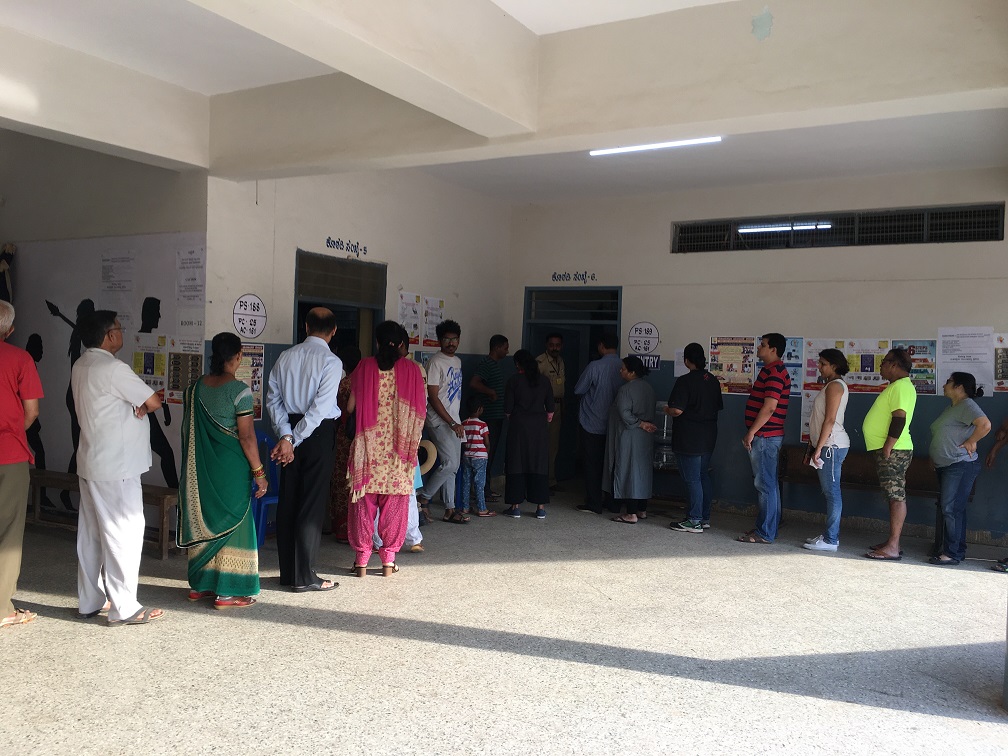
Will Bengaluru break its voter turnout jinx this election?

Bengaluru is infamous for its low polling percentage. Having just three Lok Sabha seats of the 28 in the state, Bengaluru has never touched the 60% mark in the past four decades that have seen 10 Lok Sabha elections. The three constituencies which account for more than one-sixth of the state’s 5.1 crore voting population (90.83 lakh voters), receive just half the city’s population at booths.
In 2014, in terms of voter turnout, all the constituencies in the city were last among the 28 in the state with 56% votes overall. Even in 2009, less than half of the voters in the city’s three constituencies voted. The turnout was 46.71% in Bangalore North, 44.54% in Bangalore Central and 44.73% in Bangalore South.
On Thursday (April 18), as of 3pm, Bangalore North polled 39.07%, Bangalore Central 36.31% and Bangalore South recorded 40.58%.
Residents of the IT city are vocal when it comes to voicing their grievances over a lack of suburban rail system, pothole ridden roads, drinking water problems, and rampant increase in environmental pollution. But when it comes to choosing a right candidate who could represent them in the parliament and bring development projects to the city, many go missing.
Some residents say they have lost interest in voting due to the corrupt system, while some migrants in the city blame the election commission for making it difficult to get an ID card upon transfer.
As the polling days fall between festivals and weekends, voters who go on a vacation during this time, are blamed by politicians and election officials for not being responsible citizens. During the last Assembly election, former transport minister Ramalinga Reddy said migrants in the city cause lower voter turnout.
While a few enthusiastic voters working in IT firms travelled to their respective states and cities to vote, some who migrated to the city, did not bother to even get their ID cards.
“The Congress party distributed money right in front of my house before elections. And the BJP talks of neglecting minorities if we don’t vote them to power. With such things playing day in, day out in front of me, I’ve lost interest in the system,” said Lakshmi D, an eligible voter in Bengaluru North Constituency.
Another resident, Biplab Dev, also a migrant from Kolkata claimed he had to run from pillar to post to get his voter ID card despite having an Aadhaar card.
Sanjiv Kumar, chief electoral officer, hoped that awareness campaigns may draw more urban voters to the booth, but, expressed his concern for Bengaluru in view of the long weekend.
Meanwhile, cash distribution near polling booths were reported in some areas. Complaints of polling booth officials influencing voters to vote for a particular party came to light in Benson town in Bengaluru Central.
The low voter turnout will decide whether the three seats held by the BJP for two consecutive terms, go in favour of the party. In an election fought by young leaders like Rizwan Arshad, Tejaswi Surya, Krishna Byre Gowda and prominent candidates like Prakash Raj and BK Hariprasad, this election comes with high promise on development.
Data indicates that the city polled lowest (46%) in 1991 polls, and between 1998 and 2008, the voter turnout declined. But again, after delimitation in 2008, the last two polls saw a rise in voter turnout.
Political analyst Harish Ramswamy said, “Low voter turnout normally favours the ruling party in the state. The younger generation perhaps has not taken part in elections as expected.”
“From the morning the elderly were seen in queues in most places. So it is possible that a lesser percentage of vote is an expression that the incumbent government has not been favoured as expected,” he added.
Meanwhile, psepholigist Sandeep Shastry noted that while there is no empirical evidence to show which way the votes could swing, the CSDS-Lokniti survey indicated that people who favoured the BJP showed more willingness to vote.

